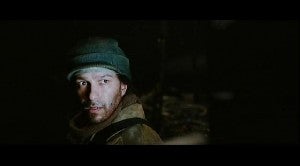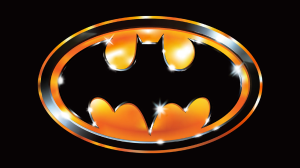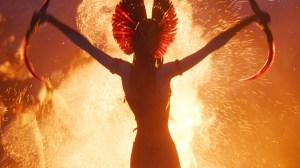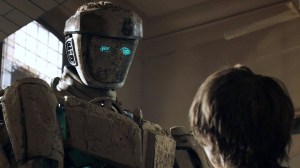Videos by ComicBook.com
That was just the first act, though, in an ambitious and impressive three-act play of a comic book series, bringing the lead characters from the depths of despair to the soaring hope afforded a populace by a young revolution in the span of just more than a year in comics. Morello joined ComicBook.com to look back on Orchid at the end of its run, and to discuss how his well-publicized politics play a role in creating his music and comics…just like everybody else.
ComicBook.com: You’ve said in previous interviews that you wanted the downloadable song that came with each copy of the comic to be basically a “score” for the series. How do you think that came out, in hindsight?
Tom Morello: Oh, fantastic. I look forward to it being a soundtrack album that accompanies the comic. You know, I’ve done a great deal of film scoring in the past and bringing that medium into the world of comics is one of the unique features of Orchid and it’s been a really fun and fulfilling part of the adventure.
ComicBook.com: I was wondering if you laid out your score ahead of time or what the process was for that.
Morello: The musical score would be after I scripted each chapter. It’s not like a literal, “and now the sword is swinging and the music goes ‘swoosh,’” you know? It’s basically capturing the vibe or a theme, a main character’s theme that is prevalent in each of the issues and approximating that with music.
ComicBook.com: I really admired the craft in Orchid. Was that something you talked a lot with Scott Hepburn about? This didn’t feel like the easiest “first comic” to write.
Morello: [Laughs] Oh, no, no…let me tell you, countless…I think more man-hours were put into Orchid than were put into building the Great Pyramid of Giza. This is a project that we took deadly seriously and I have to really take my hat off to Scott Hepburn who is not just a tremendous talent as an artist but also as a visual storyteller. And when we looked at the project as a whole from the beginning, and knew it was going to be episodic, it was going to be twelve issues, using his estimation of pacing and my insistence of certain plot points falling here or there, he’s the one who was the guiding light when it came to making each issue work in regards to telling a comprehensive story in these bite-sized pieces. Orchid was written originally as one big story, and one of the advantages I think we got from doing it episodically is we got the idea of the cliffhanger, the idea of the “press pause” every 26 pages or whatever with an emotional or action highlight. That’s something that I think added a lot of spice to the book. ComicBook.com: What was the process like? I feel like I remember reading that you guys did this book “Marvel style.”
Morello: I can tell you how we did it; Dark Horse tells me it’s kind of crazy how we did it, but it worked really well for us. We spent a lot of time together with my initial script and then blocking it into twelve chapters. Then we would sit with each one and have an exhaustive discussion on the phone of any discovered inconsistencies–do we need to bump this to the next issue, or what’s the strongest finishing point?–and then Scott would send back to me thumbnails which then we would discuss a second round and then I would write dialogue to the thumbnails based on the script.
ComicBook.com: That really helps the pacing of the finished issue, but it’s less common now because everyone’s deadlines are terrifying. Morello: Right, right. I’m familiar with the terrifying deadlines!
ComicBook.com: The first act here was incredibly bleak and dark, and doesn’t really let up until about issue six. Was that something that you worried about when you decided to make it episodic, in terms of alienating away readers? Morello: In my work, whether it’s musical or comics writing or whatever, I just trust the art. This is a story, and this is how it goes. In order for it to have the emotional impact that it does later, I didn’t want to sell out and have some big battle victories in the first four issues in order to have a spoonful of sugar. That stuff comes later and I think it’s that much more impactful because of the tension that’s been built up by the events of the first four.
ComicBook.com: Tomo Wolfe is one of my favorite characters in a long time; he’s not only Opal’s opposite number, in terms of both having been born into the Cannibal Barge culture–but also, he’s kind of this prototypical arch-conservative: “Hey, I pulled myself up from nothing, so you could, too,” he says to the slaves and whores.
Morello: Right, right. He was an amalgam–I used three historical characters and their writers as my Tomo Wolfe–Nietzsche, George W. Bush and Joseph Goebbels were sort of my touchstones for him. And if you research some of his dialogue, you will find that it is not too far off from some of their statements. What I haven’t seen commented on is that he has interesting parallels with Orchid in how they dealt with tragedies of their teens in some ways is that desire for self-reliance and revenge. It’s the chip on their shoulder that is their engine for both of them. Whereas Opal is a character who has a more optimistic view of humanity, both the villain and our heroine are sort of coming from the same place. Of course, one is powerless and one is all-powerful, and that’s one of the themes of the story that I found most attractive.
ComicBook.com: Everybody loves superhero comics, but you’ve discussed this idea of Star Wars or Lord of the Rings being somewhat problematic for you politically. Even superheroes are generally about just maintaining the status quo, so is that something you’ve ever kind of confronted as a long-time comics reader?
Morello: Here’s the thing when you’re reading comics or novels or TV shows: all art contains a political perspective. It’s not necessarily explicitly talked about, but it’s implicitly applied to the work. If the idea is to get the king back on the throne, then it comes from a monarchist perspective, you know? [Laughs] If the idea is to stop the crime wave in Gotham, there are politics in that as well. The key for Orchid for me was to make a thrilling, epic, ass-kicking narrative that had a different worldview than you normally find in a superhero story. Orchid shares some commonalities with Luke Skywalker and Frodo and with–name the hero of your choice–but the world she’s in, ther’es a brighter light shined on the inequalities that are at its core, that set up the conflict in the book.
ComicBook.com: Do you think that this reaches a new audience, or do you think you’re bringing your existing fans along and just showing them something new? Certainly with anything that gets overtly labeled as “political” in the press is going to be accused of preaching to the converted.
Morello: It’s hard to say. That was not one of the underlying concerns of this endeavor; I wanted to tell a great story and I thought I could do it via the medium of comics. Then you kind of let the chips fall where they may and the audience finds it as the audience finds it–whether it’s fans of my music who are drawn to another artistic endeavor of mine or whether it’s fans of comics who go, “Hey, that guy from Rage Against the Machine, he’s got a story to tell, too.” I don’t really look at it as preaching–first of all, the converted could use a good kick in the ass at any time so that’s never a concern of mine. But I’ll stress again: this is not first and foremost a political comic book. This is first and foremost an epic adventure with a lot of cool monsters that just has an underlying point of view that is a different kind of politics than you find in sort of the normal comics you read. This is not a Noam Chomsky lecture with light sabers–the idea is that this is a thrilling roller-coaster ride of heroes and villains and epic battles and savage monsters but that shares my point of view.
ComicBook.com: When you’re writing from a place where your main character is a prostitute, is there a kind of extra step in the mental editing that you have to do to be sure that you’re not coming off as really simplistic or misogynistic, especially when you have the old standby of her using her sexuality to distract the bad guys in an early battle scene?
Morello: Well, you have to look at her story as the totality of the twelve issues. The two underlying pivots that are the tectonic plates underneath the action adventure are class and patriarchy and sexual violence towards women. It has consciously ignored race and homophobia and chosen to focus on those two things. And you look at her journey through the twelve issues and what her sexuality means to her in issue one, versus issue five, which you’re referring to, and then by issue eight and her new relationship with her former prostitute friends and then the society that they try to build together in issue twelve. Yeah, that’s part of what happens–but that’s her choice, that’s the character’s choice as opposed to us going, “Let’s get some T&A in this thing.” She’s using that for a different means in issue five and then she’s got a different take on it at the end of the story as well. It’s a conscious decision in the writing that that is the journey that she takes. It was very clear to me, and I made it clear to both Dark Horse and to Scott Hepburn that Orchid’s attractiveness should never be used in that kind of comic tart way. The only panel in the entire series is what you’re referring to, and that’s a very conscious choice–she has thought of a plan that neither Simon nor Opal, who are plan-makers, did in order to enter Gath. So she’s kind of taken the reins of the party’s destiny using her old skills, as she’s about to develop a set of new skills. That’s one of the challenges of doing it episodically is that there’s a month between every issue and between issue four and five there’s two months or whatever, so as opposed to sitting down and reading a book beginning to end, where you go, “Ah! I see this is happening,” you get a lot of time to sort of muse on that, but I think at the end of the day the sexual politics of Orchid are pretty clear. And like I said in the introduction to the first paperback, Orchid is based on very real people in my life and it’s their voice that I’m trying to write in, in establishing what her character’s about.
ComicBook.com: Well, before we go–you’ve said before that you’ve just gotten back into comics in the last several years. Is there kind of a comics mixtape that you can recommend?
Morello: Oh, yeah. Some of it is that I’ve shipped all of my comics form Illinois out here, so I’ve been reading my old ones as well. As far as new stuff, I really like The Massive, which is another Dark Horse title which is really cool. I’ve been reading through a lot of my old Kamandi–do you remember that one, or was that before your time? Fantastic–I have all of those. There’s a book called Weird War Tales that was one of the favorites of my youth that I was looking through as we were finishing Orchid. Those are the things just lately that I’ve been looking at.












